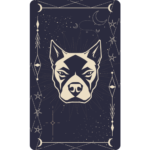The sight of a dog can evoke various emotions and thoughts in different individuals. Beyond their furry exterior and wagging tails lies a deeper symbolism that resonates with many people: loyalty. Dogs have long been celebrated for their unwavering devotion and faithfulness to their human companions. In this reading, we delve into the significance of a dog's loyalty, exploring what it means to witness such a trait and offering practical advice on how individuals can cultivate and appreciate loyalty in their own lives.
Build Trust through Consistency
One of the fundamental aspects of fostering loyalty, whether in relationships with humans or animals, is building trust through consistency. Consistency in behavior, actions, and communication establishes a sense of reliability and predictability, which are essential foundations for loyalty to flourish. For dog owners, this means adhering to a consistent routine in feeding, exercise, and training. By consistently meeting their dog's needs and expectations, owners can instill a sense of trust and security in their canine companions. Specific situations where consistency is crucial include daily walks, feeding times, and training sessions. By demonstrating reliability and predictability in these areas, owners can earn their dog's trust and cultivate a loyal bond based on mutual understanding and respect.
Prioritize Quality Time
Loyalty thrives in environments where genuine connection and companionship are valued. Spending quality time with your dog is essential for nurturing a strong and lasting bond built on mutual affection and understanding. Whether it's going for a leisurely stroll in the park, playing fetch in the backyard, or simply curling up together on the couch, carving out dedicated time for bonding activities strengthens the emotional connection between you and your dog. Specific situations where quality time is beneficial include after a long day at work, during weekends, or when experiencing stressful situations. By prioritizing quality time with your dog, you not only reinforce the bond of loyalty but also create cherished memories that deepen your relationship over time.
Communicate Effectively
Effective communication is key to fostering loyalty and understanding between humans and dogs. While dogs may not understand verbal language in the same way humans do, they are highly attuned to nonverbal cues, tone of voice, and body language. Clear and consistent communication helps establish mutual trust and reinforces the bond between you and your dog. In specific situations such as training exercises, setting boundaries, or addressing behavioral issues, using positive reinforcement techniques and clear signals can facilitate understanding and cooperation. By communicating effectively with your dog, you create a supportive and nurturing environment where loyalty can thrive based on mutual respect and trust.
Show Appreciation and Affection
Expressing appreciation and affection towards your dog is essential for nurturing a sense of loyalty and companionship. Dogs thrive on love, praise, and physical affection, and demonstrating your affection in meaningful ways strengthens the bond between you and your canine companion. Whether it's a pat on the head, a belly rub, or a heartfelt word of praise, showing your dog that they are valued and cherished reinforces their loyalty and devotion to you. Specific situations where showing appreciation and affection are beneficial include after completing a training task successfully, during moments of relaxation, or when welcoming them home after a separation. By showering your dog with love and affection, you cultivate a deep sense of trust and loyalty that forms the cornerstone of your relationship.
Be Patient and Understanding
Patience and understanding are essential virtues when it comes to cultivating loyalty in your relationship with your dog. Just as humans have their strengths and weaknesses, dogs also have their unique personalities, quirks, and behaviors. It's important to approach challenges and setbacks with patience, empathy, and a willingness to understand your dog's perspective. Whether it's overcoming a fear or anxiety, learning a new command, or adjusting to a new environment, providing reassurance, support, and guidance helps foster a sense of security and trust in your dog. Specific situations where patience and understanding are crucial include during periods of transition, when addressing behavioral issues, or when dealing with health concerns. By being patient and understanding, you create a nurturing and supportive environment where loyalty can flourish organically, strengthening the bond between you and your dog.
In Conclusion
The loyalty of a dog serves as a poignant reminder of the enduring bond that can exist between humans and animals. By understanding the significance of a dog's loyalty and following practical advice on fostering and appreciating loyalty in our own lives, we can cultivate deeper connections, mutual respect, and unwavering devotion in our relationships with our canine companions and beyond. As we strive to embody the virtues of loyalty, trust, and companionship exemplified by dogs, we enrich our lives and the lives of those around us, creating a world were loyalty reigns supreme.






